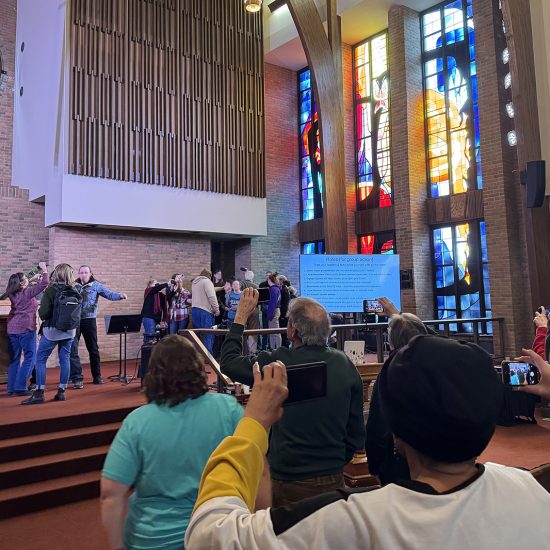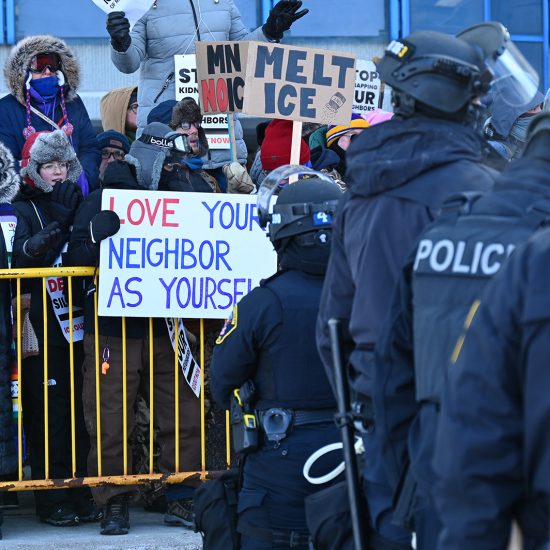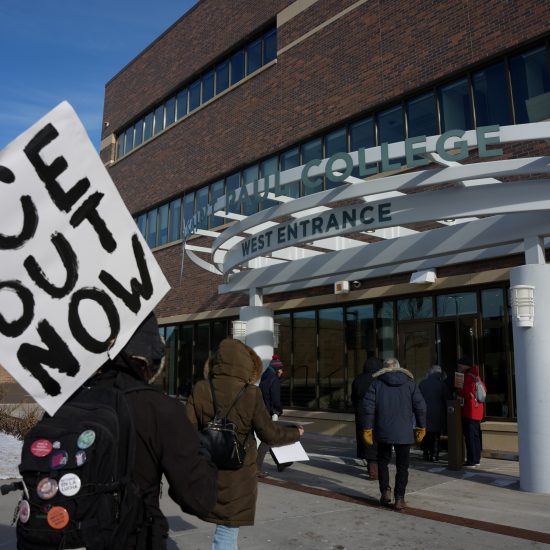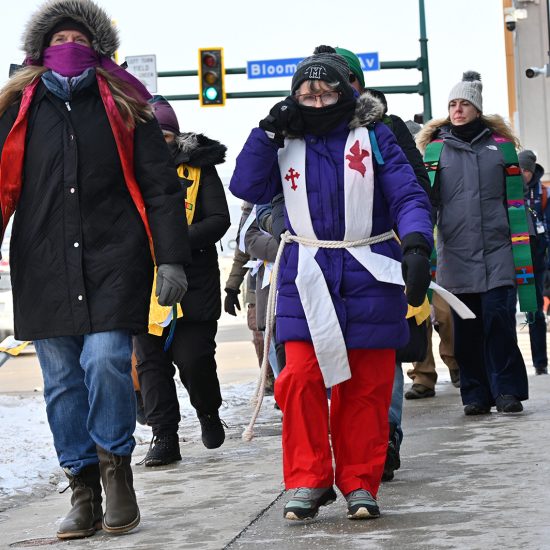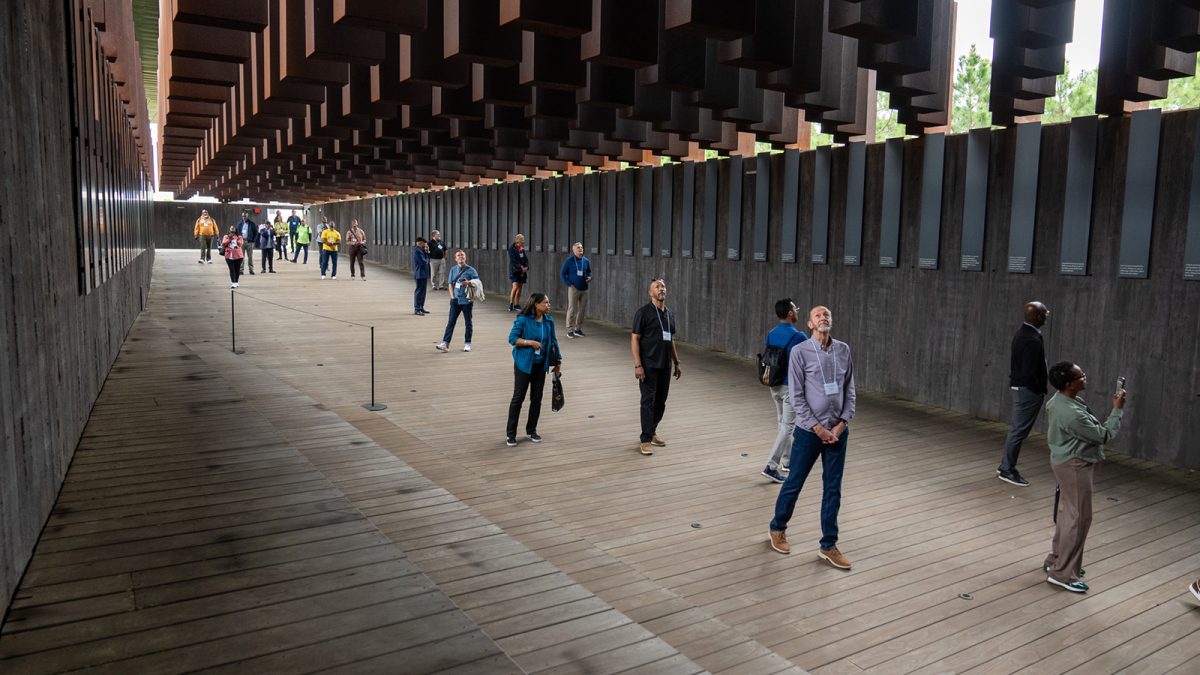
(RNS) — Bishop W. Darin Moore of the African Methodist Episcopal Zion Church remembers what it was like in the days after the 2020 murder of George Floyd.
“You saw initiatives being taken by churches, by governmental entities, or by corporations to acknowledge first, and then to confront and then to improve racial relations,” he recalled.
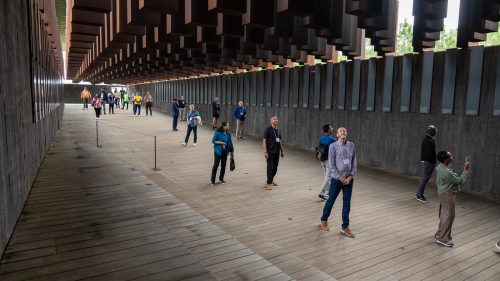
People tour The Legacy Museum in Montgomery, Ala., as part of an event organized by the National Association of Evangelicals in 2024. (Courtesy photo)
Now, said Moore, the leader of eastern North Carolina churches of his historically Black denomination, most of the work to ensure Black history is taught appears to be happening in Black churches. That’s in part due to backlash against what he termed the “bogeyman” critics created as they opposed diversity, equity, and inclusion efforts and critical race theory — two concepts that have become politically polarizing terms in recent years.
A new Pew Research Center study found that 27% of Americans surveyed in February 2025 said the increased focus on issues of race and race inequality led to changes that improved the lives of Black people after the death of Floyd, a Black man from Minneapolis. He died when White police officer Derek Chauvin held his knee on Floyd’s neck for more than nine minutes. Chauvin was convicted in 2021 of Floyd’s murder, and three other officers were found guilty of other related charges.
However, almost three-quarters (72%) said the newfound focus on racial matters did not have a great influence on improving Black lives. Back in 2020, 52% thought it would, according to Pew.
Across denominations and races, clergy are noticing the emphasis shifting away from race relations that occurred in the wake of Floyd’s death. They’ve seen temporary improvements and then retrenchment but say efforts nevertheless continue to foster understanding and bridge divides.

Participants hold hands during a National Unity Weekend event in June 2024. (Courtesy photo)
“Right after George Floyd and Breonna Taylor and others were murdered, there was this swell of people of all different skin hues that came together and marched and made statements,” said the Rev. Jean Hawxhurst, a White United Methodist ecumenist who is president of Churches Uniting in Christ. “Right now, we’re kind of in a complacency,” noting what she views as racist attitudes of the current Trump administration “welcoming in Afrikaners and not welcoming in people with darker colored skin.”
The CUIC committed in 2023 to a three-year period focused on anti-racism, has had quarterly dialogues and may have related book studies in the future. Asked if she sees a change in the relationships between predominantly White and mostly Black churches in her circles, Hawxhurst said, “I wish I could say I had definite examples of yes. I think what I see is the hope. I’m not sure I see yet the living out.”
Walter Kim, the National Association of Evangelicals president, said after an initial “incredible jump in engagement and participation” in racial justice and multiethnic ministries, there was a realization of how complicated the issues are. He said there is a “recalibration” occurring regarding how there are not merely Black and White dimensions to reconciliation, but the need to also involve a range of ethnic groups, including Asian, Hispanic, and Native American communities.
For instance, Kim said the NAE found that recent opportunities for in-person interaction were more effective than the online “Racial Justice Assessment Tool” it created in 2023 to provide suggestions of books and online courses based on individual Christians’ answers to a brief survey.
For the last two years, the NAE has held a spiritual retreat with evangelical leaders of color, who often work in predominantly White spaces, for “encouragement and swapping of best practices to stay involved in the long-term labor.”
And in 2024, the NAE gathered dozens of leaders, about 40% White, 40% Black, and 20% of other backgrounds, for a forum and tour of The Legacy Museum and other Montgomery, Alabama, properties of the Equal Justice Initiative, including the National Memorial for Peace and Justice, created to remember thousands of lynching victims. Some of the Black participants discovered the names of their forbears, prompting collective lament, Kim said.
“We’re entering deeply into each other’s story and finding some deep points of resonance,” said Kim, who is Asian American, recalling a small-group discussion he had with Native American, African American and Jamaican American leaders that has led to greater attention and activism on policy issues such as water rights and deportation threats.
Bishop Derek Grier, the founder of the upcoming third annual National Unity Weekend — a Christian event aimed to facilitate unity among different races and ethnicities — said “only time will tell” if religious efforts focused on intentional interactions between evangelical leaders of different racial and ethnic groups will lead to a lasting solution.
More than 100 churches across two dozen states have signed up for the events of the weekend from June 7-8, which will feature churches distributing food in predominantly minority communities with the help of charities such as the faith-based Convoy of Hope. A similar number of churches took part in 2023 and 2024, he said.
“Last year, we distributed over 100,000 pounds of food,” said Grier, who is Black. “This year, we hope to do almost as much, however, we’ve expanded it to include shoes and haircuts.”
But the organization’s related “Let’s Talk” Zoom discussions that began in 2022, with Asian, African American, Hispanic, and White evangelical leaders discussing personal experiences, have lost participation over time, Grier said. They used to attract around 60 people and now have about half that many logging in to the regular sessions.
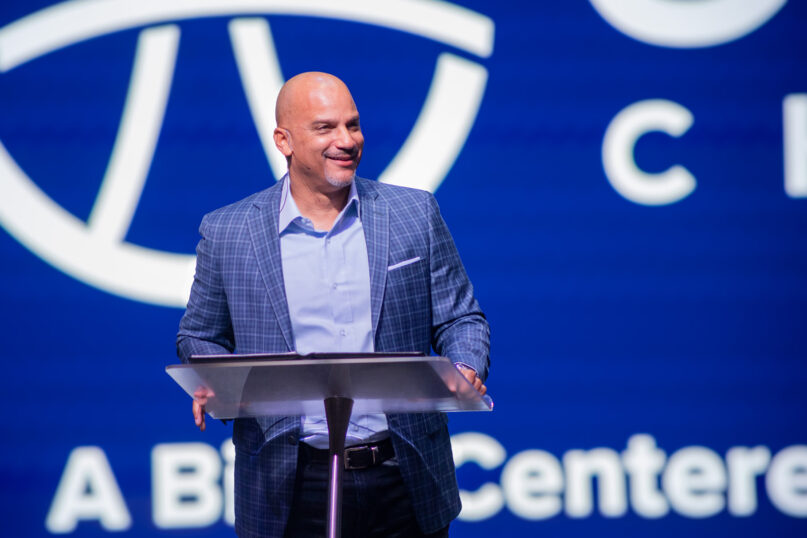
Bishop Derek Grier at Grace Church in Dumfries, Va. (Photo by Katajh Marshall)
Marshall Blalock, a member of the steering council of Unify Project, a racial reconciliation initiative started by two former Southern Baptist Convention presidents, said he is concerned it may be difficult for some clergy to broach topics related to race relations due to the current political climate.
“Some of the politics of our country right now have labeled certain efforts toward racial reconciliation in political terms, and that’s made pastors more reticent to help push toward the racial reconciliation for fear of being labeled in some way,” Blalock said.
He has pastored First Baptist Church of Charleston, South Carolina, for 28 years and said his congregation is used to his preaching about bridging divides.
“It’s not always easy to take this path, but it’s also true that I believe the gospel requires us to take this path,” he said.
Unify Project focuses on building relations between local pastors of different races, encouraging them to meet over meals and build trust as they determine ways to help their communities by gathering their congregations together at least once a year and working on joint service projects at least annually.
“Unify doesn’t make statements that would polarize anybody,” Blalock said, adding he and other project leaders are working to help restart some reconciliation efforts that have stalled.

Marshall Blalock in a Unify Project video. (Video screen grab)
Well before 2020, religious groups had taken steps toward reconciling among races and protesting racism. The Southern Baptist Convention adopted a landmark racial reconciliation resolution on its 150th anniversary in 1995, and the National Council of Churches held the A.C.T. to End Racism Rally, seeking to “awaken, confront and transform” on Washington’s National Mall in 2018, on the 50th anniversary of the assassination of the Rev. Martin Luther King Jr.
Religious leaders now plan to take part in events marking the fifth anniversary of Floyd’s death on May 25, including the Rev. Al Sharpton at a private memorial service at Floyd’s gravesite; vigils in Washington and Springfield, Massachusetts, with moments of silence for nine minutes and 46 seconds; and a “George Floyd Angel-versary event” at an Evangelical Lutheran Church in America-affiliated congregation in Minneapolis.
Moore, the AME Zion bishop who spoke at the 2018 rally as the NCC’s chair, said the regression now seen after advancements in race relations and calls for improvements for Black Americans is not new. It also happened, he noted, when Jim Crow laws followed the post-slavery Reconstruction period, and when Donald Trump was elected president after Barack Obama was voted in as the first Black president.
“There’s going to come progress out of all of this anti-DEI and -CRT, all of this resentment that has been infecting this country,” he said. “We’re going to resist, persist, and we’re going to advance and come out in a better place. So we are honest about the conditions that we’re facing, but we are not hopeless about what we’re facing.”



